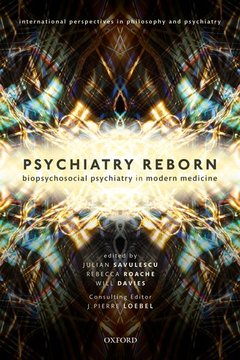Description
Psychiatry Reborn: Biopsychosocial psychiatry in modern medicine
International Perspectives in Philosophy and Psychiatry Series
Coordinators: Savulescu Julian, Roache Rebecca, Davies Will
Language: English
Subjects for Psychiatry Reborn: Biopsychosocial psychiatry in modern...:
Publication date: 10-2020
432 p. · 15.6x23.5 cm · Paperback
432 p. · 15.6x23.5 cm · Paperback
Description
/li>Biography
/li>
Psychiatry Reborn: Biopsychosocial Psychiatry in Modern Medicine is a comprehensive collection of essays by leading experts in the field, and provides a timely reassessment of the biopsychosocial approach in psychiatry. Spanning the sciences and philosophy of psychiatry, the essays offer complementary perspectives on the ever more urgent importance of the biopsychosocial approach to modern medicine. The collection brings together ideas from the series of Loebel Lectures by world leaders in the field of psychiatry and associated Workshops at the University of Oxford, including revised versions of the Lectures themselves, and a wide range of related commentaries and position pieces. With contributions from psychiatry, psychology, neuroscience, and philosophy, the book provides the most comprehensive account to date of the interplay between biological, psychological, and social factors in mental health and their ethical dimensions. The 23 chapters of this multi-authored book review the history and place of the biopsychosocial model in medicine, and explore its strengths and shortcomings. In particular, it considers how understanding this interplay might lead to more effective treatments for mental health disorders, as developments in genomic and neurobiological medicine challenge traditional conceptions and approaches to the research and treatment of mental health disorders. The book explores the challenges and rewards of developing diagnostic tools and clinical interventions that take account of the inextricably intertwined bio-psycho-social domains, and the ethical implications of the conceptualization. It concludes with chapters drawing together the book's range of expertise to propose a best conception of the model, and how it might be adopted going forward in an age of exponentially increasing technological advances and of integrated/collaborative care. The volume is intended to present the BPS model as it stands today in the academy, the lab, and the clinic, and to start to address the challenges and potential that the model has for each.
Professor Julian Savulescu has held the Uehiro Chair in Practical Ethics at the University of Oxford since 2002. He has degrees in medicine, neuroscience and bioethics. He directs the Oxford Uehiro Centre for Practical Ethics within the Faculty of Philosophy, and leads a Wellcome Trust Senior Investigator award on Responsibility and Health Care. He directs the Oxford Martin Programme for Collective Responsibility for Infectious Disease at the Oxford Martin School at the University of Oxford. He co-directs the interdisciplinary Wellcome Centre for Ethics and Humanities. He is a leader in medical and practical ethics, with more than 400 publications, an h index of 61 and over 14,315 citations in total. He spent 10 years as Editor of the Journal of Medical Ethics, the highest impact journal in the field, and is founding editor of Journal of Practical Ethics, an open access journal in Practical Ethics. Dr Rebecca Roache was educated at the universities of Leeds and Cambridge, and worked at the University of Oxford before moving to Royal Holloway in 2014. She writes on issues in ethics, language, and psychiatry, and frequently appears in the media. She is currently writing a book on the philosophy of swearing for OUP. Dr Will Davies is a lecturer in Philosophy at the University of Birmingham, specialising in the Philosophy of Psychology and Psychiatry. He completed his BPhil and DPhil at Balliol College, Oxford, where he was a Jowett Senior Scholar, and then held a Junior Research Fellowship at Churchill College, Cambridge before joining the faculty at Birmingham in 2017. Dr Davies has published articles in journals such as Analysis, Philosophical Studies, British Journal for the Philosophy of Science, and Philosophy of Science. He is currently PI of a British Academy/Leverhulme grant on Colour and Form in the Disordered Mind. Professor J. Pierre Loebel was born in Romania, schooled in Palestine and England, studied philosophy and experimental psychology at Oxford Unive
© 2024 LAVOISIER S.A.S.
These books may interest you

Child and Adolescent Psychiatry 54.14 €



